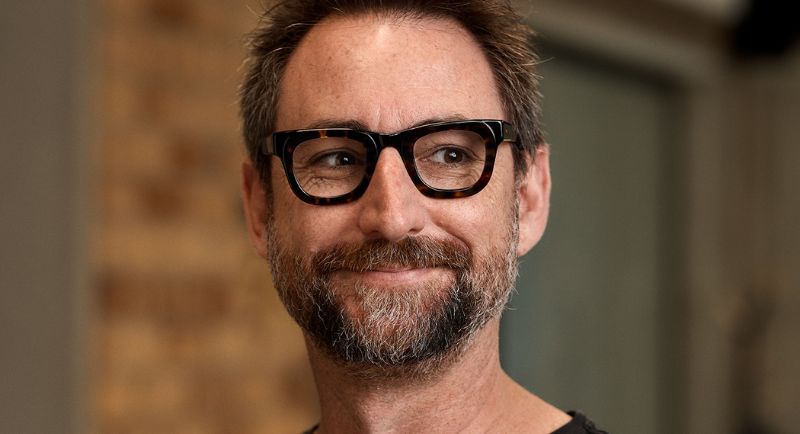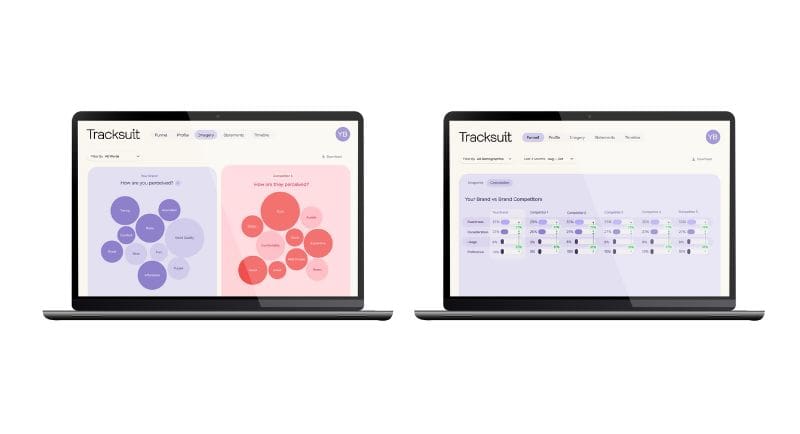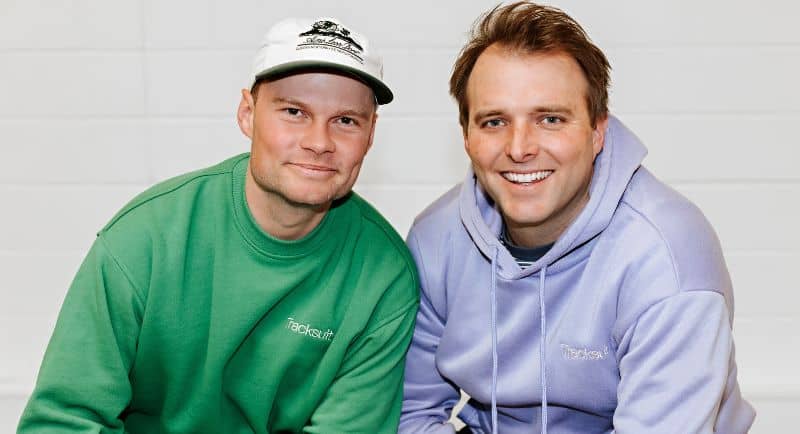Tracksuit is building momentum following a recent $20.5 million Series A investment injection, and co-founder James Hurman says the brand tracking start-up’s big pull is simple: it’s cheaper than competitors.
Speaking to Mediaweek, Hurman said that while traditional brand tracking, provided by large research companies, has been around for decades, it is expensive — ranging from $80,000 to $100,000 a year.
“For most businesses, it’s just out of the question in terms of its affordability,” he said. Tracksuit’s offering is much more cost-effective, he continued, at $15,000 to $25,000 annually.
Hurman also highlighted Tracksuit is a “friendlier, more delightful tool to use.”
“Traditionally, the way research was presented to an organisation was via a big PowerPoint deck, with many charts and graphs and numbers, some of which were useful, some of which didn’t tend to be.
“We just put it all on a dashboard that sits alongside performance marketing dashboards, which marketers are used to nowadays. It is a much more fit-for-purpose way of taking in the brand health tracking information you’re getting so that you can use it as a diagnostic tool for where to take your brand next.”
Hurman is also an author and the founder of the New Zealand-based consultancy Previously Unavailable, which conceived and built Tracksuit alongside research firm TRA. Alongside Tracksuit, it has built insights platform Ideally, and drinks brands AF Drinks and Odd Company.
Tracksuit’s Series A funding round was led by Silicon Valley-based firms Altos Ventures and Footwork, and takes the start-up – founded in 2021 and led by co-founders and CEOs Connor Archbold and Matthew Herbert – to a valuation of $142.9 million. The round’s investors included co-founder of frank body and branding agency Willow & Blake Bree Johnson, ex Airbnb Lenny Rachitsky, and Allbirds co-founder Tim Brown.
Hurman explained that the funding would allow Tracksuit – which tracks more than 4,000 brands across Australia, New Zealand, US, UK, and Canada – to accelerate the growth of its operations, particularly in the US and the UK.
It will ramp up in those markets by hiring more people and reaching more businesses “that have benefited enormously from being able to afford brand health tracking, where they would not have been able to before,” Hurman added.
Some of Tracksuit’s Australian clients include Bondi Sands, Arnott’s, GHD, and Heaps Normal. The brand tracking company has also worked with several global companies, including MyFitnessPal, Supergoop, SkillShare, and Steve Madden.
Hurman said that feedback from clients has been positive across the board.
“We’ve got many customers who are ex-big corporate marketers who had the budget for this. They’ve gone and worked for smaller, more exciting companies with much lower budgets. The fact that they can afford this is one of the things that they love.”
Hurman noted that the quality of the dashboard experience and the explanations make it much more reportable for marketers. Marketers can easily take the information from Tracksuit and use it to present to their executive teams and boards to prove that what they’re doing is working, he said.
“That’s enormously valuable if you’re a brand marketer in any business. It gives those around you the confidence that what you’re doing is generating a return.”
Tracksuit will now focus on its data offering to customers and the business’s “growth path” in the year ahead.
“Those are the two things to expect in the coming year—a little more presence and a focus on how we create an amazing experience for the marketers using Tracksuit.”
Hurman on humour: “It’s hard to fit the purpose in a hilarious way.”
Hurman also shared his thoughts on introducing a humour category to this year’s Cannes Lions.
Over the past 10 to 12 years, the industry has seen a drop in humour, he said, which is a result of marketers leaning into purpose.
“Whether it’s a social or environmental purpose, that kind of marketing position can be pretty sombre; it’s hard to fit the purpose in a hilarious way.”
Hurman noted that part of the shift is due to marketers believing they need to give more thought to the humour they use in today’s world.
“There’s been some hesitation to use humour as much as it has been in the past. However, from an effectiveness perspective, humour is one of the most effective strategies for driving sales and market share. When we connect on an emotional basis, we use humour to do so.
“The community around Lions, and certainly Lions themselves, have recognised that humour would do well in the marketing effectiveness community.
“So this is a way of encouraging us to not get too serious about everything we do.”
–
Top image: James Hurman


